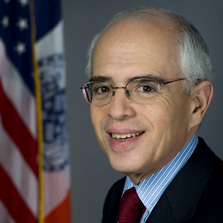Anthony Shorris: City Hall Open to Funding Transit Via Toll Reform
After an Albany legislative session that came and went without any serious effort from Governor Cuomo to address the $14 billion shortfall in the MTA’s next five-year capital program, there are faint stirrings of action.

Most intriguing: Yesterday, First Deputy Mayor Anthony Shorris sent a letter to MTA Chairman and CEO Tom Prendergast outlining the city’s interest in a number of possible funding solutions, including the Move NY toll reform plan [PDF].
Without additional funding, the MTA capital plan — which Cuomo has called “bloated” — will continue to saddle straphangers with excessive debt and bigger fare hikes in the future. Significant investments to increase systemwide capacity could be trimmed, like the MTA’s effort to modernize its ancient signals. With subways getting more crowded and delays becoming more common, transit riders face the prospect of higher prices for worse service if nothing is done.
Previously, the de Blasio administration had sidestepped any discussion of Move NY. In April, Shorris told reporters that he hadn’t actually read the details of the proposal. Recently, the administration has faced some criticism for its silence on toll reform while it cites Manhattan congestion as a reason to limit the growth of Uber and other car services.
Cuomo controls the MTA and is the one elected official with the power to make toll reform a live issue. Previously he has dismissed toll reform as a non-starter, so it’s not surprising de Blasio hasn’t jumped to make the first move. With this letter, the administration is at least keeping the option of Move NY on the table if the governor comes around on it.
Now that City Hall has cracked open the door to toll reform ever so slightly, is there any sign that Cuomo will show some leadership on this issue?
In response to Shorris’s letter, the MTA would only discuss the governor’s involvement in the vaguest terms. “The MTA has been working closely with Governor Cuomo’s office on a plan to meet the essential capital needs of a system that is critical to the City’s daily life and economic strength of the region,” said MTA spokesperson Adam Lisberg.